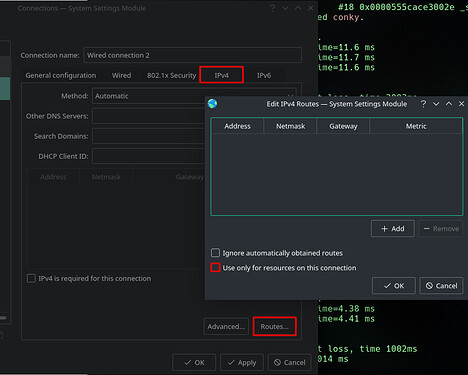I have a batteries-included (non-Architect) Manjaro install. I think a recent kernel switch (to 5.11 and back to 5.4) broke my networking. On every boot, I have no Internet at all until I run sudo dhcpcd. Then Internet magically returns.
I assume some networking service got stopped or uninstalled, and I’m wondering which one that might be. I suspect systemd-networkd or systemd-resolved, both of which are disabled:
$ systemctl status systemd-networkd
● systemd-networkd.service - Network Service
Loaded: loaded (/usr/lib/systemd/system/systemd-networkd.service; disabled; vendor preset: enabled)
Active: inactive (dead)
TriggeredBy: ● systemd-networkd.socket
Docs: man:systemd-networkd.service(8)
$ systemctl status systemd-resolved.service
● systemd-resolved.service - Network Name Resolution
Loaded: loaded (/usr/lib/systemd/system/systemd-resolved.service; disabled; vendor preset: enabled)
Active: inactive (dead)
Docs: man:systemd-resolved.service(8)
man:org.freedesktop.resolve1(5)
https://www.freedesktop.org/wiki/Software/systemd/writing-network-configuration-managers
https://www.freedesktop.org/wiki/Software/systemd/writing-resolver-clients
This answer suggests it’s systemd-resolved, but I want to make sure.

 Good detective work, xabbu!
Good detective work, xabbu!
 Ever since switching kernels, I have no Internet when my VPN is connected to any of its servers. Well, sort of. I can still
Ever since switching kernels, I have no Internet when my VPN is connected to any of its servers. Well, sort of. I can still 


